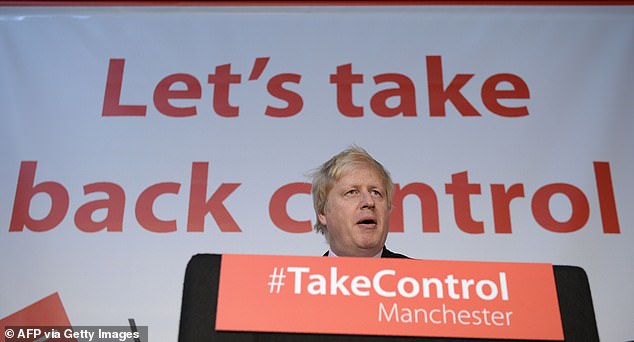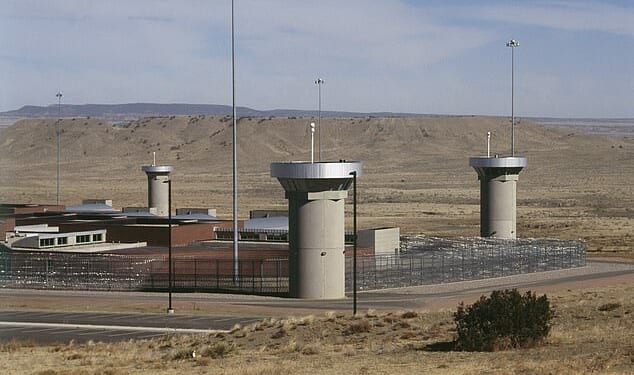When Boris Johnson swept into Downing Street in 2019, he vowed to deliver the core promise of the Vote Leave campaign and ‘take back control’ of Britain’s borders.
The Conservative manifesto pledged an ‘Australian-style points-based system to control immigration’. In black and white, voters were told: ‘There will be fewer low-skilled migrants and overall numbers will come down.’
Six years on, everyone knows what actually happened. Instead of reducing the numbers of migrants, the last Tory government oversaw the biggest influx in British history.
Between 2022 and 2024, more than three million arrived – a population larger than Birmingham and Manchester combined. Of course, some also left – but this was, nevertheless, an immigration superhighway that betrayed the Tories’ mandate.
Timebomb
To combat this, Reform UK leader Nigel Farage last week vowed that, if he came to power, he would abolish Indefinite Leave to Remain (ILR).
This status entitles migrants who stay for just five years – and their dependents – to social housing, free NHS care, benefits and the state pension in perpetuity. Children born here whose parents are on ILR automatically gain British citizenship.

When Boris Johnson swept into Downing Street in 2019, he vowed to deliver the core promise of the Vote Leave campaign and ‘take back control’ of Britain’s borders, writes Jack Anderton
The Centre for Policy Studies think-tank estimated that more than 800,000 migrants from recent years would apply for ILR when their five-year visas run out.
Funding their benefits over their remaining lifetime will cost a staggering £234 billion – which they originally calculated to be worth £8,200 to every UK household.
Yet instead of addressing this fiscal timebomb, the Prime Minister yesterday described the Reform plan – to ask those with ILR status to reapply for a visa and potentially deport those rejected – as ‘racist’ and ‘immoral’. This insults millions of ordinary Britons deeply concerned at the scale of mass migration the country has experienced in recent years.
But the bill to taxpayers is only the start. The deeper damage is being done, day by day, to young Britons like me, who are now being forced to compete with millions of international workers for graduate and non-graduate roles alike.
Our universities already play host to some 750,000 foreign students – equivalent to the entire population of Leeds – eagerly welcomed by institutions who relish the higher fees they pay.
The proportion of international students who stay on after graduation has soared from 18 per cent in 2019 to 56 per cent in 2023, following a Tory policy that entitles non-British students to work here for at least two years after completing their courses – three years if they are PhD students.
Until the dying days of Tory rule in January 2024, these international students could even bring family members and dependants with them – and then quietly switch to a work visa before finishing their courses.
Half of non-EU students and their dependants switched to work or other visas in 2024 after three years in the UK, according to the Office for National Statistics. Yet it wasn’t to become engineers, software developers or to fill other highly skilled roles.
Analysis by the University of Oxford’s Migration Observatory shows around 40 per cent of people who switched directly from study visas to skilled worker visas in 2024 went into care work, using the student route as a back door into the labour market.

As yesterday’s The Mail on Sunday reported, Rachel Reeves is convinced the answer to Britain’s economic woes is to make it even easier for young foreigners to work here
The results of all this have been entirely predictable. According to the High Fliers Research survey, just 27 per cent of final-year students had secured a job by February of this academic year – down from 33 per cent two years ago and the lowest figure since the pandemic year of 2021. On average, final-year students made a record 21 applications each this year, up from 12 in 2023.
Other factors are also at play, of course: artificial intelligence is eating into graduate roles in finance, law and media, while Rachel Reeves’ rise in employers’ National Insurance at her growth-destroying Budget last October has also discouraged hiring.
But given these alarming structural trends, and given that young people comprehensively rejected the Tories at the last election, you might have thought that Labour would be doing things differently. You’d be wrong.
As yesterday’s The Mail on Sunday reported, Reeves is now convinced that the answer to Britain’s economic woes is to make it even easier for young foreigners to come and work in here. She believes that Brussels’ flagship ‘youth mobility scheme’ would boost growth and reduce the need to raise taxes further. Even if she is right – and experts including the Institute For Fiscal Studies insist she is not – it’s clear that this controversial initiative would risk damaging the career prospects of British graduates and non-graduates alike.
Marketed here as a way for 18-to-30-year-old Britons to enjoy life in Paris or Berlin, the scheme would open our jobs market to hundreds of thousands of unemployed and cheap Europeans, many from countries where youth joblessness is in double digits.
Joke
In Spain, for example, 27 per cent of young people (who have left school and are aged under 25) are not working, according to official figures.
The maths is simple: if the number of workers rises faster than the number of jobs, wages fall. And British wages have been stagnant or falling since 2008, according to the Centre for Cities think-tank, with workers in most parts of the country no better off than they were 16 years ago.
One in four jobs advertised to graduates on Indeed pays the minimum wage or only slightly higher – and remember, the average British graduate is already £53,000 in debt by the time they begin repaying their loan, according the government’s own statistics.

University of Oxford’s Migration Observatory found 40 per cent of people who switched directly from study visas to skilled worker visas last year went into care work, using the student route as a back door into the labour market
Separately, Starmer plans to relax the so-called Global Talent visa, supposedly reserved for world-class innovators and elite figures in critical industries.
In practice, this scheme has become a joke. One successful applicant who came to Britain last year was Kubra Uzun, a transgender Turkish drag performer. Uzun was later found openly advertising escort services in east London: hardly the ‘talent’ the scheme was designed to attract.
Failed
Yet rather than tightening standards, Labour wants to cut the Global Talent application fee – already a mere £766 – to make it even easier for firms to import cheap labour. All this will do is jeopardise the future of young British workers.
Across the Atlantic, Donald Trump is going the other way. His administration has just raised the cost of America’s H-1B ‘skilled worker’ visa to around $100,000 per employee, sharply encouraging U.S. firms to hire local workers rather than import staff from abroad.
Trump is putting American workers first. The Tories and Labour have done the opposite. Both are locked into a failed economic model built on mass migration and low wages. The Conservatives broke their promises and presided over record inflows: they now limp on as a zombie party awaiting electoral burial.
Labour seems intent on flooding the market with yet more workers from abroad, ensuring lower pay and fewer opportunities for young Britons.
A government serious about Britain’s future would act fast. Abolish ILR. Raise visa costs dramatically to make it more expensive to hire foreign workers than to train British ones. Reduce and restrict immigration.
Young Britons deserve better. They deserve a government that values their education and hard work, secures the borders – and refuses to treat them as disposable chips in a global labour market.
Jack Anderton is a political consultant for Reform UK











